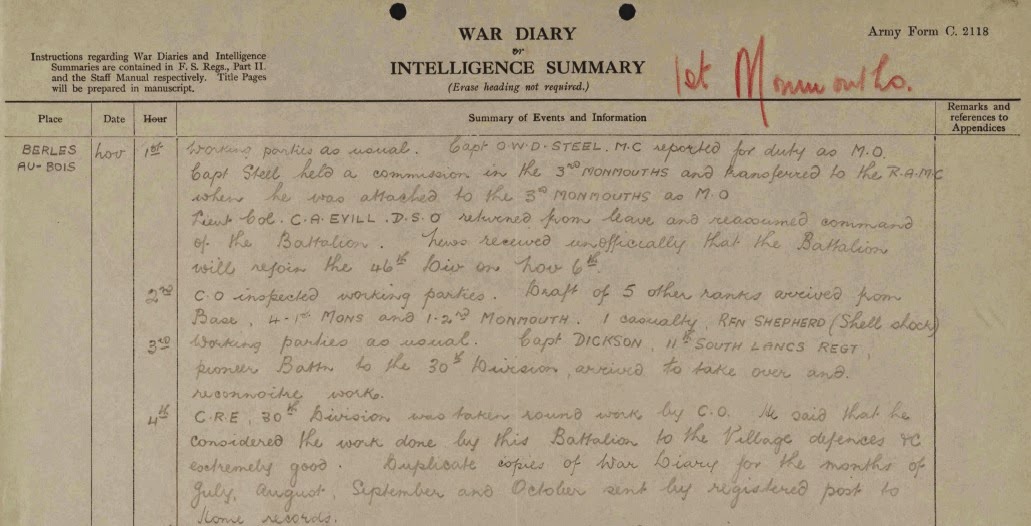Alfred married my great aunt Lizzie at Preston Wynne Church on 18th March 1914 and moved into her family home at Rose Cottage, Preston Wynne with their son, also called Alfred William. Alfred snr. worked as a Roadsman; i.e. building and maintaining roads.
 |
| Alfred's Medal Index Card |
Luckily Alfred's WW1 service record survives (and can be viewed on Ancestry.com), so we have a reasonable idea of what he did during the Great War. He began his military career on 20th November 1915 (several months after he gained, and sadly lost, his daughter Valda), when, at the age of 32 years and 6 months the 5' 5¾" roadsman attested and was put on the Army Reserve.
This attestation can also be evidenced by looking through old copies of the Hereford Mercury. In the edition for the 23rd November 1915, Alfred is listed among a number who attested under the Derby Scheme in group 38 (married men born 1882/3). As a Derby Scheme man he was entitled to wear a khaki armband over his civilian clothes to show that he had attested and was awaiting mobilisation.
| Alfred listed in the Hereford Mercury |
At the beginning of June 1916 he was mobilised and subsequently posted to the 3/2nd Reserve Battalion, Monmouthshire Regiment as Private 4532 Alfred Hill. The 3/2 Monmouthshire Regiment was a 3rd line battalion, which meant it was basically held in reserve, raised in Pontypool before moving to Abergavenny and ultimately being based in Oswestry. In September 1916 this battalion was absorbed into the 3/1 Reserve Battalion, Monmouthshire Regiment.
 |
| Alfred's Medal Roll |
A month later Alfred left the UK to join the British Expeditionary Force (BEF), setting sail from Southampton on the 12th October and landing at Rouen the next day. On 2nd November 1916 Private Hill was posted to the 1st Monmouthshire Regiment, a territorial unit, with the new service number 15003.
The war diary for the 1st Monmouthshires shows that 5 'other ranks' from the 4/1 and 1/2 Monmouthshires joined the battalion on the 2nd, so it is possible that Alfred was among them. At this time the battalion was at Berles-au-Bois, where their working parties were engaged in strengthening the defensive trenches around the village, whilst preparing to move on to join the 46th Division.
 |
| A section of the 1st Monmouthshire Regiment's diary - November 1916 |
After marching to Humbercourt, they were transported by motor bus to Caours, where they spent a couple of weeks parading, drilling and training, before marching to Mezerolles on the 23rd and thence to Lucheux on the 25th for more drilling and parading. This period was enlivened on the 30th by a visit from the army commander, General Sir Edmund Allenby.
At the beginning of December the 1st Monmouthshires were at Souastre. Some companies worked on communication trenches and the support line, while others worked for the Royal Engineers on the roads. The working parties continued to toil throughout the month, hampered by bad weather, enemy bombardment and on occasion being strafed by a German aircraft.
 |
| A section of Alfred's service record |
At the end of December Alfred's service record shows that he was posted to the Advanced Horse Transport Depot for duty with Road Construction units under service number 227736, although this number does not appear on his medal roll. The Advanced Horse Transport Depot, based at Abbeville, was an Army Service Corps unit that provided horses and wagons to replace losses at the front.
 |
| Excerpt from the Advanced Horse Transport Depot diary |
According to Alfred's service record, on 1st March 1917 he was transferred to the Royal Engineers as Pioneer 451928 Alfred Hill, 3rd Glamorgan RE (another Territorial unit), where he was posted to 315 Road Construction Company. The war diary for the Advanced Horse Transport Depot does indeed mention sending a 'refitment' by rail to the 315 RCC on that day.
 |
| A section of Alfred's service record |
He remained with this unit until March 1919, when he was transferred to 309 Road Construction Company. The war diaries for these Road Construction Companies are held by the Royal Engineer's Museum in Kent. However they are not yet digitised and so I have been unable to read them, although obviously he continued to build or repair roads!
Alfred was dispatched to the UK on 21st June 1919, posted to a Royal Engineers Stores Company under service number WR/30803. He spent a month at Prees Heath Dispersal Camp before being discharged into the class Z army reserve (technically still a soldier and liable to be called up again in a grave national emergency but able to go about in civilian clothes).
 |
| A section of Alfred's service record |
He returned to Rose Cottage, which Lizzie kept as a post office, as well as bringing up four children. While the 1921 census lists him as an agricultural worker at nearby Brick House farm, Alfred continued his trade as a roadsman - my father's abiding memory of his uncle being him visiting on his way to work with his shovel tied across the handlebars of his pushbike. This memory is shared by his granddaughters, who have been very helpful in assisting me in my research, and who say that their grandfather Fred was exceptionally talented at digging ditches - a valuable skill on the Western Front!
 |
| Rose Cottage today |
Alfred passed away on the 5th January 1971, aged 88. He is buried in Preston Wynne churchyard alongside his wife.
No comments:
Post a Comment